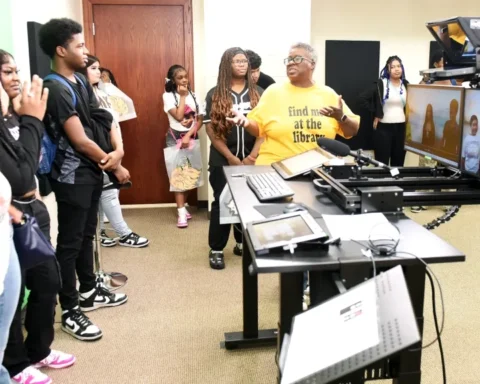By Wil Hehemann
Since 2016, the University of Arkansas at Pine Bluff’s (UAPB) “Keeping it in the Family” (KIITF) Program has worked to address historic barriers to African American success in forestry. The program provides educational resources and technical assistance to African American forest landowners to protect and retain their family land for future generations, Kandi Williams, Extension program aide and coordinator for the program, said. Tom Martin, CEO of the American Forest Foundation, recently visited southern Arkansas to meet some of the forest landowners who have benefited from the university’s forestry programming.
“We were honored to have Mr. Martin visit as part of our annual assessment of the Keeping it in the Family Program,” Williams said. “The assessment is largely a time to review the project’s strengths and weaknesses, but more importantly, it’s a chance to celebrate the outstanding accomplishments the team and landowners have made. During a site visit, Mr. Martin was able to hear the landowners’ stories and family histories firsthand.”
The site visit took place on the property of Kenneth and Jacqueline Carswell in Pine Bluff, Arkansas. The Carswells spoke about how they purchased forest land and used Extension and outreach services provided by the UAPB Small Farm Program to access the appropriate organizations and resources to transform their land.
With assistance from the Natural Resources Conservation Service (NRCS) and the Arkansas Department of Agriculture, Forestry Division, they developed a forestry management plan and used funds from the NRCS Environmental Quality Incentive Plan (EQIP) to install recommended conservation practices. In addition to improving their forest land, the family cleared some land to set up a fully-functioning organic farm, which they named “Peaceful Pines Farm.”
During the event, the Carswell’s son Keith gave a tour of the improved forest land and the organic farm.
“I especially enjoyed the site visit, where I saw the magic of a land-owning family and their natural resource advisors implement the landowners’ vision for their forest,” Martin said. “It really underscored the tie between people and sustainable forests … It’s clear that the staff working directly with the landowners have passion for their jobs and a deep well of knowledge that they deploy on the landowners’ behalf. I hope we can find a solution to provide legal help to families that need it to address heir property and other issues – this is a consistent challenge for organizations serving Black landowners.”
Martin said a highlight of the event was the tour by Keith Carswell.
“His sense of place came through very strongly,” he said. “I’m sure that their forest is a wonderful counterweight to his regular job as a merchant sailor. Japan, Myanmar and Diego Garcia are exotic, but the pine forests of Arkansas must feel like home.”
Later in the event, Shawn Boler, a Howard County, Arkansas landowner, led a session in which different landowners shared stories about how they were able to better the sustainability and profitability of their operations thanks to partnership with UAPB. He also shared his own story about how he has collaborated with KIITF to maintain and enhance the land that his great-grandfather originally purchased in 1896.
Boler’s active stewardship of the land has paid off. Last year, the family farm, known as the “Ransom Tact Adamson Estate,” was recognized as a certified American Tree Farm and Arkansas Century Farm.
Addressing the problem of heir property
Arkansas Senator Stephanie Flowers, who was in attendance during the event’s luncheon, credits UAPB with addressing heir property and other challenges Black landowners in southern Arkansas face. Heir property – land that is inherited by a group of family members – can be a major problem for African American communities in Arkansas. This type of property leaves families without the clear titles that allow for active management of the land, thereby limiting any economic returns.
Senator Flowers represents District 25, which includes parts of Pine Bluff and Jefferson County, as well as parts of Arkansas, Desha, Lincoln, Monroe and Phillips Counties.
“Black land ownership was very significant in this area as Blacks acquired land after slavery, during Reconstruction,” she said. “A big gap came, and generations later lost ownership and the benefits that come with owning land. I find the issues discussed at the conferences by professionals within the legal field acquainted with all the nuances of heir property, and the government agencies of forestry, agriculture and economic development are all quite relevant and very helpful.”
As an attorney, Senator Flowers said she recognizes the importance of family relationships in jointly-owned property.
“The people equation is about personal social relations,” she said. “Challenges present themselves because of broken or separated family members not knowing one another and for a whole host of other reasons too. A big part of establishing the platform for benefitting from the land is bringing family members together. There are legal tools, wills and trusts that can help the process. Mediation is helpful too.”
Senator Flowers credits Dr. Henry English, head of the UAPB Small Farm Program, for developing programming relevant to her constituents. She said programs such as KIITF promote cultural, familial and historical ties to land and awareness and support for economic opportunities.
“I would say that the biggest benefit (of the KIITF Program) is teaching African Americans about the value of their land and how to make good use of it, providing healthy food, medicines, clothing, financial gain, et cetera,” she said. “Dr. English has done a marvelous job in putting together great forums and conferences for large and small audiences. I like that I have even seen him in the field with African American landowners, advising and helping with development of the land itself.”
Furthering the work of the Sustainable Forestry and African American Land Retention Program Network
UAPB’s KIITF Program is part of the Sustainable Forestry and African American Land Retention (SFLR) Program Network. During the summer of 2019, the American Forest Foundation (AFF) assumed the administrative, fundraising, policy advocacy and technical support functions of the SFLR program in collaboration with the SFLR Network.
“AFF values its partnership with SFLR, comprised of eight Black-led organizations that work with African American forest owners,” Martin said. “Our collaboration with SFLR also helps AFF achieve its mission and vision to empower family forest owners to make a meaningful conservation impact on their land. Our strengths in fund-raising, policy and expansive networking relationships will set up and support the already-accomplished program for continued growth and success.”
Martin said he aims to ensure the SFLR Network can fully leverage AFF’s resources, including the AFF development team, the U.S. landowner community and integral organizations such as Trillion Trees and the Forest Climate Working Group. The work the foundation does on Capitol Hill is also intended to benefit SFLR.
Martin said the AFF policy team’s connection with Senator Debbie Stabenow of Michigan has helped SFLR advance quickly. Thanks to the support, Kedren Dillard, a forest landowner and member of the AFF board of trustees, testified before the Senate Committee on Agriculture, Nutrition and Forestry representing both SFLR and AFF. She spoke about how the SFLR Network helps African American landowners turn their family forests into sustainable economic assets, as well as how family forest owners can contribute to climate change mitigation.
For more information on the American Forest Foundation, visit www.forestfoundation.org.
The University of Arkansas at Pine Bluff offers all its Extension and Research programs and services without regard to race, color, sex, gender identity, sexual orientation, national origin, religion, age, disability, marital or veteran status, genetic information, or any other legally protected status, and is an Affirmative Action/Equal Opportunity Employer.





